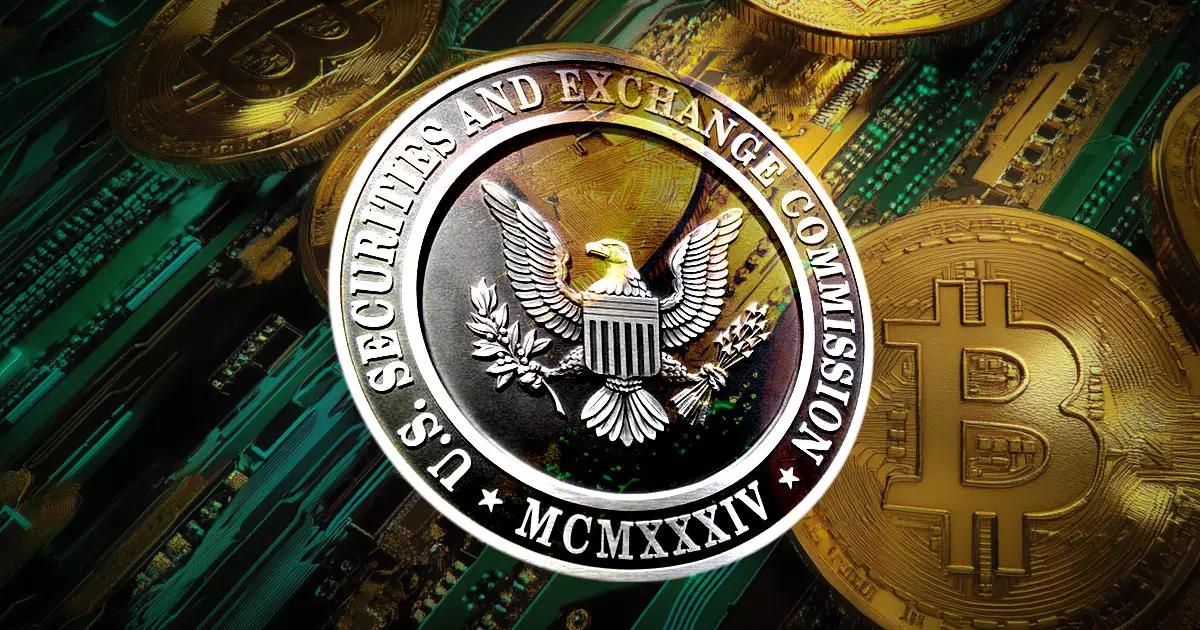In a fragile digital economy where innovation and regulation often clash, the recent meetings held by the U.S. Securities and Exchange Commission (SEC) with industry giants like BlackRock and members of the Crypto Council for Innovation’s Proof of Stake Alliance have unveiled critical dialogues on crypto exchange-traded products (ETPs). Yet, these talks raise more questions than they answer. Are we genuinely moving towards regulatory clarity, or is this merely a smokescreen for entrenched bureaucratic interests? The complexities of staking and in-kind redemption models indicate that we may still be miles away from cohesive regulatory frameworks.
BlackRock’s Stance: A Major Player in a Risky Game
BlackRock’s participation in the meetings signaled a strong institutional interest in the burgeoning crypto asset market. Their focus on in-kind redemptions for crypto ETPs is a reflection of the asset manager’s efforts to pave the way for products that could generate significant investor interest. However, one cannot overlook the inherent risk involved in this strategy. BlackRock’s heavyweight status in traditional finance begs the question: Are we accommodating financial giants in a space meant to challenge the status quo? The narrative that BlackRock is a pioneer for regulatory clarity is superficial; their motives must be scrutinized. It’s worth noting that an over-reliance on established financial institutions could stifle genuine innovation and possibly dilute the decentralized ethos of cryptocurrency.
The Importance of Staking: Vital but Controversial
A focal point of the SEC’s discussions was the mechanism of staking within ETPs. Representatives from the Proof of Stake Alliance presented varied staking models, each teeming with innovation yet fraught with challenges. The risk-reward calculus changes dramatically when staking enters the equation; it arguably offers potential for higher returns but also increases complexity and regulatory oversight.
The idea that excluding staking from ETPs would undermine investor returns is not merely an industry talking point but a potential reality. However, the proposals put forth—such as the “Services Model” and the “Liquid Staking Token Model”—reflect a reluctance to fully address the implications of these innovations on investor protections. A regulatory environment that does not embrace, or at least cautiously consider, staking’s role in proof-of-stake (PoS) ecosystems threatens to stifle the evolution of ETPs and restrict market dynamics.
Regulatory Uncertainty: The Double-Edged Sword
While the engagement of the SEC with heavyweights like BlackRock and influential voices from the Crypto Council can yield positive outcomes, it also shines a light on a more precarious truth. Regulatory uncertainty remains a significant barrier for many market participants. The belief that more discussions will lead to clarity is a doublespeak that embodies the ineffective nature of regulatory bodies. As we witnessed in earlier discussions regarding staking alongside voices from Jito Labs and Multicoin Capital, the focus seems to be on creating frameworks that appease regulators rather than genuinely fostering innovation.
Instead of empowering the crypto sector, the SEC’s meticulous deliberation could inadvertently push nascent projects and innovative startups into a corner, making room only for established players. An overemphasis on conventional regulatory frameworks does not acknowledge the unique characteristics that make cryptocurrencies distinct.
Implications for Institutional Investors
Institutional investors are often viewed as the arbiter for the legitimacy of any financial product. However, the current trajectory points toward a watering-down of crypto’s disruptive potential. The SEC’s pattern of meetings, devoid of clear regulatory guidelines, sends mixed signals to institutional investors. They find themselves entangled in an ecosystem that simultaneously seeks to embrace innovation and regulate it under old paradigms.
For institutional players like BlackRock, this dance can be beneficial; they may gain first-mover advantage in a still-evolving space. However, for the broader market, this favoritism raises ethical concerns about fairness and equity. If regulations cater primarily to large institutions, then the promise of financial democratization that crypto initially heralded may be in jeopardy.
The SEC’s continued deliberation over crypto ETPs signifies an ongoing struggle between regulation and innovation. Institutional meetings, while outwardly progressive, may merely serve as a façade to quell mounting public scrutiny. The key takeaway here is that true partnership between regulators and innovators is essential for real advancements. Whether we’re veering closer to clarity or diving deeper into systemic chaos remains an open question, and one that deserves our undivided attention as this financial drama unfolds.

